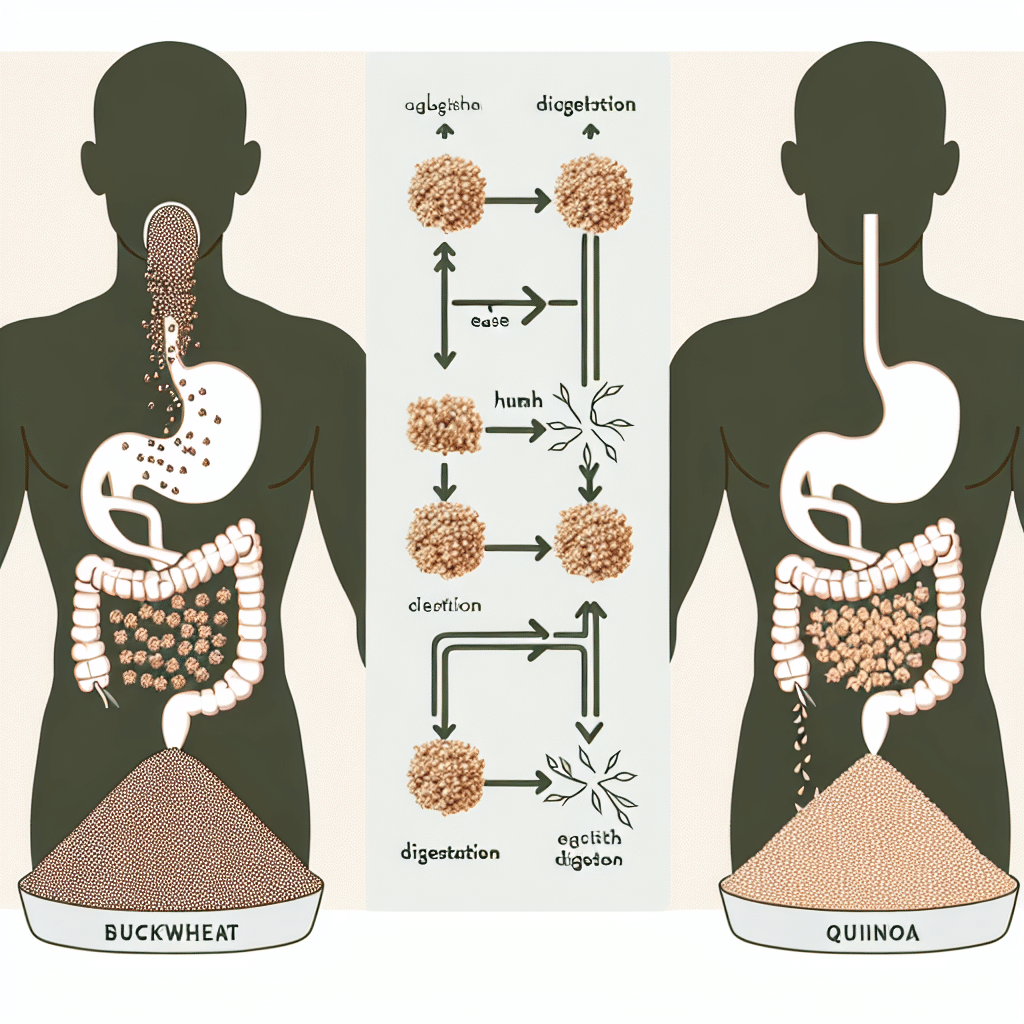Is Buckwheat Easier To Digest Than Quinoa?
-
Table of Contents
- Buckwheat vs. Quinoa: A Digestibility Comparison
- Understanding Digestibility
- Nutritional Profiles of Buckwheat and Quinoa
- Fiber Content and Digestive Health
- Anti-Nutrients and Their Impact
- Protein Quality and Digestion
- Case Studies and Research
- Personal Digestive Health
- Conclusion: Which Is Easier to Digest?
- Discover ETprotein’s High-Quality Protein Products
Buckwheat vs. Quinoa: A Digestibility Comparison

When it comes to choosing healthy grains, buckwheat and quinoa often come up as top contenders. Both are praised for their nutritional profiles and are popular among those looking for gluten-free options. However, when it comes to digestibility, many people wonder which of the two is easier on the stomach. In this article, we will delve into the digestibility of buckwheat and quinoa, examining their nutritional content, health benefits, and how they affect the digestive system.
Understanding Digestibility
Before comparing buckwheat and quinoa, it’s important to understand what we mean by “digestibility.” Digestibility refers to how easily a food can be broken down and absorbed by the digestive system. Factors that influence digestibility include the presence of fiber, anti-nutrients, protein quality, and the individual’s digestive health.
Nutritional Profiles of Buckwheat and Quinoa
Both buckwheat and quinoa are considered pseudocereals, meaning they are seeds that are consumed as grains. Here’s a quick look at their nutritional content per 100 grams:
- Buckwheat: 343 calories, 13.25g protein, 3.4g fat, 71.5g carbohydrates, 10g fiber
- Quinoa: 368 calories, 14.12g protein, 6.07g fat, 64.16g carbohydrates, 7g fiber
Both grains are rich in vitamins and minerals, including magnesium, phosphorus, and B-vitamins. They are also high in antioxidants and provide a complete protein source, containing all nine essential amino acids.
Fiber Content and Digestive Health
Fiber plays a significant role in the digestibility of foods. It can either aid or hinder digestion, depending on the type and amount of fiber present. Buckwheat has a higher fiber content than quinoa, which can be beneficial for digestive health as it helps to regulate bowel movements and prevent constipation. However, for some individuals, too much fiber can lead to digestive discomfort, bloating, and gas.
Anti-Nutrients and Their Impact
Anti-nutrients are compounds that can interfere with the absorption of nutrients and can affect digestibility. Both buckwheat and quinoa contain anti-nutrients such as phytic acid, tannins, and oxalates. However, these can be reduced through proper preparation methods such as soaking, sprouting, or fermenting.
Protein Quality and Digestion
The quality of protein in a food can also affect its digestibility. Both buckwheat and quinoa provide high-quality proteins, but quinoa is particularly noted for its complete protein profile. This means that it contains all the essential amino acids in the right proportions for human dietary needs, which can make it easier to digest for some people.
Case Studies and Research
Research on the digestibility of buckwheat and quinoa is somewhat limited, but studies suggest that both grains are generally well-tolerated and digested by most people. One study found that quinoa was particularly beneficial for individuals with celiac disease due to its gluten-free status and ease of digestion.
Personal Digestive Health
It’s important to note that individual digestive health plays a crucial role in how well one can digest buckwheat or quinoa. People with certain digestive disorders may find one grain easier to digest than the other. It’s always best to listen to your body and consult with a healthcare professional if you have concerns about digestibility.
Conclusion: Which Is Easier to Digest?
In conclusion, both buckwheat and quinoa are nutritious options that can be part of a healthy diet. When it comes to digestibility, it largely depends on the individual. Buckwheat’s higher fiber content may be beneficial for some, while others may find quinoa’s complete protein profile easier to digest. Proper preparation can also enhance the digestibility of both grains.
Ultimately, the best way to determine which grain is easier for you to digest is through personal experience. Try incorporating both into your diet and observe how your body responds. If you have a sensitive digestive system or specific dietary concerns, consult with a healthcare professional for personalized advice.
Discover ETprotein’s High-Quality Protein Products
If you’re looking to supplement your diet with high-quality protein sources, consider ETprotein’s range of organic bulk vegan proteins. Their products, including rice protein, pea protein, and various seed proteins, are non-GMO, allergen-free, and boast a neutral taste. ETprotein’s offerings cater to a wide array of industries and dietary needs, making it easy to find a protein solution that works for you.
About ETprotein:
ETprotein, a reputable protein and L-(+)-Ergothioneine (EGT) Chinese factory manufacturer and supplier, is renowned for producing, stocking, exporting, and delivering the highest quality organic bulk vegan proteins and L-(+)-Ergothioneine. They include Organic rice protein, clear rice protein, pea protein, clear pea protein, watermelon seed protein, pumpkin seed protein, sunflower seed protein, mung bean protein, peanut protein, and L-(+)-Ergothioneine EGT Pharmaceutical grade, L-(+)-Ergothioneine EGT food grade, L-(+)-Ergothioneine EGT cosmetic grade, L-(+)-Ergothioneine EGT reference grade and L-(+)-Ergothioneine EGT standard. Their offerings, characterized by a neutral taste, non-GMO, allergen-free attributes, with L-(+)-Ergothioneine purity over 98%, 99%, cater to a diverse range of industries. They serve nutraceutical, pharmaceutical, cosmeceutical, veterinary, as well as food and beverage finished product distributors, traders, and manufacturers across Europe, USA, Canada, Australia, Thailand, Japan, Korea, Brazil, and Chile, among others.
ETprotein specialization includes exporting and delivering tailor-made protein powder and finished nutritional supplements. Their extensive product range covers sectors like Food and Beverage, Sports Nutrition, Weight Management, Dietary Supplements, Health and Wellness Products, and Infant Formula, ensuring comprehensive solutions to meet all your protein needs.
As a trusted company by leading global food and beverage brands and Fortune 500 companies, ETprotein reinforces China’s reputation in the global arena. For more information or to sample their products, please contact them and email sales(at)ETprotein.com today.














